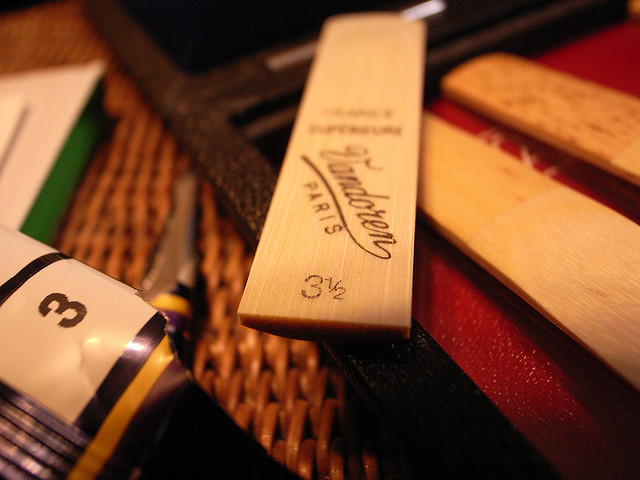Your saxophone’s sound is almost entirely influenced by the reed you choose to use. Therefore, you want to make sure you have the best possible reed for your play style as well as for the type of music you’d like to play. But there’s such a variety of choice available in saxophone reeds that it is easy to feel confused when picking the reed. Here are some of the key factors that you need to keep in mind when you are shopping for a new saxophone reed.

Pick the Right Strength
One of the key components of saxophone reeds is the strength. The strength is important for two reasons. First, it influences the kind of sound your saxophone makes. Second, it can also determine the way you play the saxophone.
It is a common misconception to think that the stronger your reed’s strength the more professional player you are. This isn’t the case as a lower strength reed can actually just suit your play style better.
Nonetheless, the Saxophone Players website does recommend starting out with a lower strength reed. It’s a bit easier on your jaw muscles if you might not yet be used to playing a lot of saxophone. You might want to start with a softer reed and experiment with stronger strengths once you’re more used to playing regularly.
Each manufacturer will use different ways to outline the strength of the reed. Most often it is marked by a number and the higher the number, the stronger the strength of the reed will be.
Selecting the Right Material
There are two types of saxophone reeds available. The most common reeds are made from natural materials, often from cane plants. The maintenance of natural reeds is a bit more laborious than the synthetic reeds. But for a number of sax players, the sound is much more pure when playing with a cane reed.
Despite this, more and more players are also starting to use the synthetic reeds, often made from different rubber mixtures. The Sax.co.uk article on picking reeds says there are some great advantages for using synthetic reeds. They are most likely going to last longer and don’t require as much attention and care.
But again, in the end it is more of a personal choice whether you prefer natural or synthetic reeds. There is no real difference to the actual sound and therefore you should try both to see which one suits your own play style better.
Don’t Forget the Mouthpiece
On top of this, it’s crucial to keep in mind that the mouthpiece you use will also influence your reed. Therefore, when you are picking out the reed you also need to carefully consider the kind of mouthpiece you want to use.
So, if you already have a mouthpiece you really like, try to match its qualities with the reed you’re looking to purchase. As a general guideline, narrow tip mouthpieces work better with higher strength reeds and wider tips are more suitable for softer reeds.
Hopefully, the above information helps you to choose the perfect saxophone reed. You can also contact our tutors and see what kind of reeds they are using and recommending, while the “Tone & Gear” sections of each saxophone series features the tutor discussing what they use to create a great sound.
Are you a guitarist? Check out our full range of online guitar lessonsAre you a saxophonist? Check out our full range of online saxophone lessons
Subscribe to Pro Music Tutor from as little as £7.99 per month
Related Posts
-
Breaking Down the Blues Scale for Saxophone
The blues and the saxophone go hand-in-hand, but mastering the techniques of the blues scale can take practise and patience. The blues scale is an excellent tool for improvisation and is a great stepping stone to creating your own compositions. It also enables you to play with other musicians without the need to be following […]
View All >> -
NEW RELEASE: Roberto Manzin’s Latin Improvisation Series 1
We’re delighted to announce the release of the brilliant Roberto Manzin’s first set of online saxophone lessons here at Pro Music Tutor with the launch of Latin Improvisation Series 1. Roberto Manzin is one of the world’s leading saxophonists, and in Latin Improvisation Series 1 you can learn some of the great tips and techniques […]
View All >>
Latest Blog Entries
-
The Benefits of Online Music Education
Learning music has never been easier, since the internet and modern technological advancements have opened the doors to countless possibilities, expanding the subjects people can choose from and how the lessons are taught. Now, people can study a whole host of music-related topics; from learning to play guitar or DJing, to understanding the inner workings […]
View All >> -
Essential Jazz Guitar Scales that are Easy to Learn
Improvising in jazz requires the ability to play in different keys over different chords. Results certainly do not come overnight, but with diligent practice, you would be surprised by what you can achieve. Many people ask me about what scales I use as if they were some big secret. While knowing your scales is very […]
View All >>
Blog Categories
- Categories
- Guitar Tips (93)
- History (36)
- How-To (38)
- Interviews (3)
- Music Industry (121)
- Prolinks Guitar (2)
- Prolinks Lessons (3)
- Prolinks Tutor's Profile (1)
- Saxophone Tips (40)
- Uncategorized (6)
Tags
Archive
- November 2018 (1)
- February 2018 (1)
- December 2017 (1)
- November 2017 (1)
- October 2017 (1)
- July 2017 (4)
- May 2017 (2)
- April 2017 (1)
- August 2016 (2)
- July 2016 (1)
- June 2016 (2)
- May 2016 (3)

